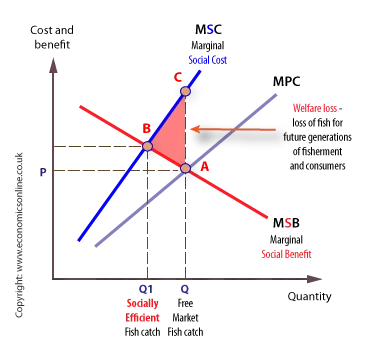
Depletion of fish stocks
Depletion of fish stocks
Fish stocks around the world have fallen considerably, with stocks of cod, in particular, being heavily depleted. Most experts agree that the current levels of consumption are unsustainable.
A study by Science magazine (2006) claimed that every seafood species would fall below commercially viable levels by 2048.
SOS on Oceans from World Bank
Video courtesy of australianetworknews.
There are a number of reasons for the depletion of fish stocks, including:
- A lack of property rights over the sea, as ownership is difficult, if not impossible, for individuals to establish.
- There is also information failure because fishermen do not know the size of available fish stocks.
- Externalities are also associated with fishing, given that fisherman fail to take into account the impact of their actions on others, including the impact of over-fishing on other fishermen in the future.

- The high fixed cost of boats is also an incentive to fish as much as possible in order to cover the fixed costs.
- Fishermen are often heavily subsidised, which encourages them to catch more. This happens in the EU, through the Common Fisheries Policy.
- There is also a Prisoner’s Dilemma, which means there is an incentive for fishermen to catch as much as they can because that is what they expect others to do. A prisoner’s dilemma is any situation where the ‘pay-off’ from an action depends upon decisions made by other parties. This means that an individual’s behaviour is influenced by the predictions that they make about how others will react in response to their behaviour. In this case, fishermen may predict that all other fishermen will try to catch as much as they can before the stocks run out. The combined outcome is that shrinking stocks encourage more fishing and not less! Even if fishermen agree to limit their catch many will expect others to cheat, hence cheating would become the ‘norm’.
- Finally, widespread pollution of the sea has also contributed to the gradual depletion of fish stocks.
Remedies
There are a number of possible remedies for reducing the rate of fish stock depletion, including, attempts to reduce the demand for fish, and to increase the supply of fish.
Reducing the amount of fishing.
The quantity of fish caught could be reduced by:
- Establishing or extending property rights over the sea, although this would be difficult to implement and police.
- Imposing a special conservation tax on fishing. However, the effectiveness of such a tax would depend upon the elasticity of demand for fish.
- Introducing a complete or partial ban on fishing. In 2005 the UK government, implementing EU Common Fisheries Policy, imposed a limit of 178 days on fishing days for British boats operating in the North Sea. However, there would be a welfare loss if ‘too little’ fish are caught, including the loss jobs. An alternative approach might be get fishermen to sign up to a voluntary ban, though there may be an incentive to cheat.
- Authorities can also reduce the size of fish quotas, especially for cod, which are at levels close to extinction. In 2005, the EU reduced quotas for cod, herring, and whiting by 15%.
(Source: The Times, December 2005).
- Authorities can also legislate to limit the size of nets, or to increase the size of the mesh – to enable the smaller fish to escape being caught.
- Authorities can also issue special permits to fish, as a way of controlling the number of fishermen, or fishing days.
- Better information for fishermen on the current size of fish stocks, and estimates for the future.
- Reduce or abolish subsidies – in 2002, through its Common Fisheries Policy, the EU agreed to stop subsidising boat building – the Common Fisheries Policy of the EU covers:
Conservation of fish stocks
Creation of a single and organised market for fish, and an external fisheries policy regarding other countries
Increasing the supply of fish
Reducing demand will lead to a replenishing of fish stocks, but supply can also be targeted directly, such as by giving subsidies to fish farmers. However, this would take time, and uses scarce resources which could be spent elsewhere.
A mixture of the above is likely to be the most effective in the long run, with the emphasis on a reduction in the amount of fishing undertaken. The case of fish highlights two basic strategies for reducing many market failures; either by altering behaviour by using the price mechanism, or circumventing the price mechanism and imposing solutions through legislation.
What if too few fish are caught?
If fishing is over-restricted, there is also a net welfare loss.

The socially optimal level of fishing is at Q1, but restricting output to Q2, say through a partial ban, would result in lost economic welfare of EBF.

